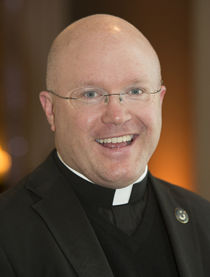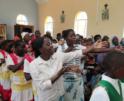
Faith
Cardinal Dolan stressed that the RPD was a "draft document" and added, "boy, ... does it ever need major revisions," stressing that that's what he and the other bishops were hard at work doing during the Synod's second week.

Landry
On October 15, Cardinal Timothy Dolan of New York appeared from Rome on CBS This Morning talking about the Extraordinary General Assembly of the Synod of Bishops on the Pastoral Challenges to the Family in the Context of Evangelization.
Charlie Rose, Jane Pauley and Norah O'Donnell were peppering Cardinal Dolan about controversial items that had appeared in the Synod's interim report (the Relatio post disceptationem or RPD) that had been released two days earlier.
Cardinal Dolan stressed that the RPD was a "draft document" and added, "boy, ... does it ever need major revisions," stressing that that's what he and the other bishops were hard at work doing during the Synod's second week. He thanked CBS and all the media for "paying attention to that first draft" and politely challenged, "I hope you'll give as careful consideration to the ultimate Relatio (report) that will come out in a matter of days."
Well, the media have not given anywhere near the attention to the final report of the Synod as it did to its sensational and much-flawed draft. In this case, however, no one can blame the media: Ten days after the Oct. 18 publication of the Relatio Synodi (RS, "The Report of the Synod"), it still exists only in the Italian original, a public relations fiasco equal in incomprehensibility to the decision to publish the draft report.
The 5,400 word interim RPS was released simultaneously to the media in Italian, English, French, Spanish, and Portuguese; the definitive 8,000 word RS would take about one-third longer to translate, but still can easily be translated and reviewed in a day's work. (I used to translate documents into English for three different Vatican dicasteries).
The fact that the translations of the RPD appeared instantaneously but the RS still hasn't appeared after a week and half suggests that those in charge of getting the documents translated were much more zealous about having people read the much-flawed draft than the much-corrected final document.
That's perplexing, to say the least.
Last week I was in Louisiana giving talks on the Synod to Legatus Chapters throughout the state and had a chance to do a textual comparison between the draft and the final document. A staggering 700 amendments had been proposed to the 58 paragraph interim report and the final report was much ameliorated. I'd like to note some of the more important improvements.
The final document emphasized the Good News about the family far more than the draft's deflating catalogue of well-known problems facing the family. The new first sentence focuses on the "joys, burdens and hopes" of the families of the world, thanking the Lord "for the generous fidelity with which so many Christian families respond to their vocation and mission ... with joy and faith" despite "obstacles, misunderstandings and sufferings." That more thoroughly Christian tone pervades the new draft.
The RS communicated much more clearly that the Church's teachings on marriage flow not from earthly deliberation concerning sociological realities but from the "revelation of the love of God in Jesus and uninterruptedly taught by the Fathers, spiritual masters and Magisterium of the Church." It pondered the indissolubility of marriage, for example, not as a "yoke imposed on people but rather as a 'gift' given to people united in marriage," an endowment rooted in his Jesus' indissoluble, faithful, commitment to the Church. It also drew much more explicitly from the rich contributions from the one whom Pope Francis has called the "Pope of the Family," St. John Paul II.
It expanded the discussion of the family to embrace "parents, grandparents, brothers and sisters, relatives near and far and the bonds between in-laws." More care was given to single moms and those who are victimized by abandonment and divorce. It added paragraphs on adoption, parental rights in the education of children, and Marian devotion in the family to help the family stay together praying together.
The RS totally eliminated the confusing language in the RPD about the "positive elements in imperfect forms" involved in cohabitation and civil marriages, about "valuing" the same-sex orientation itself rather than those with the same-sex orientation, and about the "law of gradualness" that seemed to imply sinful behavior was no big deal. Instead, it focused on emulating Jesus' two-fold response of mercy: warmly embracing those in sinful circumstances while at the same time lovingly calling them to "go and sin no more."
It also added a discussion on the terrible destruction wrought in families by pornography. Adultery of the heart can be as ruinous to marriage and familial love as adultery in the flesh (Mt 5:27-29) and young people raised in a pornographic culture are often deeply wounded in their capacity to love real person and form faithful, chaste bonds.
Finally, it wisely included revised paragraphs on the pastoral care of those who are divorced and remarried and those with same-sex attractions, even though these revised didn't receive the necessary two-thirds supermajority to be approved by the Synod. If they had been excluded from the RS altogether, media commentary may have focused more on what wasn't in the document than what was.
The reasons why these paragraphs failed to garner sufficient garner approval was because they were just a dry summary of what was discussed or what the Church teaches rather than an adequate, evangelical proposal of the loving call to conversion and holiness for those in these circumstances, something that Synod fathers and the whole Church need to do better.
When the translations of the RS finally emerge, everyone should see that the conclusions of the Synod are as different from the general impressions given through the media as the RS is from the RPD.
Despite the inexcusable lag time, hopefully not just the media but all intelligent Catholics will fulfill Cardinal Dolan's wish to give it as much "careful consideration" as they gave to the coverage of the interim report.
- Father Roger J. Landry is a priest of the Diocese of Fall River, Massachusetts, who works for the Holy See’s Permanent Observer Mission to the United Nations.
Recent articles in the Faith & Family section
-
Wounds, not scarsJaymie Stuart Wolfe
-
A special collection in the liturgy libraryFather Robert M. O'Grady
-
Witness to a Transfiguration in KenyaMichele Miers
-
Understanding the ScripturesScott Hahn
-
'Cabrini' does extraordinary job of bringing saint to lifeBishop Nicholas DiMarzio


















